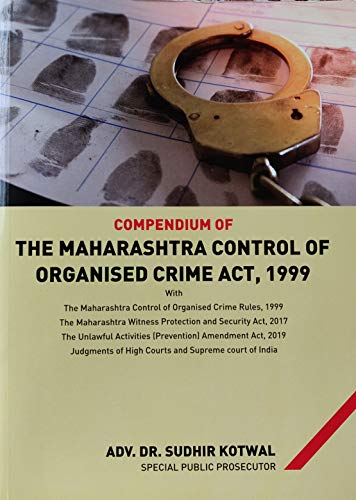Understanding the Maharashtra Control of Organised Crime Act (MCOCA)
Introduction to MCOCA and Its History
The Maharashtra Control of Organised Crime Act, popularly known as MCOCA, is a powerful law enacted by the state of Maharashtra, Bharat, in 1999 to tackle organised crime and terrorism. It was introduced to address the growing menace of criminal syndicates, especially in cities like Mumbai, which was grappling with underworld activities, extortion rackets, and terrorist threats during the 1990s. MCOCA was first introduced as an ordinance on February 24, 1999, by a coalition government of the Bharatiya Janata Party and Shiv Sena. It later became a full-fledged law after receiving the President of Bharat’s assent, following the procedure laid out in Article 245 of the Indian Constitution. This made MCOCA the first state-specific legislation in Bharat designed to combat organised crime, replacing the temporary Maharashtra Control of Organised Crime Ordinance of 1999.
The law was a response to the increasing sophistication of criminal networks, which were exploiting gaps in existing legal frameworks. Traditional laws, like the Indian Penal Code, were not equipped to handle the complexities of organised crime, such as money laundering, extortion, and terrorism. MCOCA’s enactment marked a bold step by Maharashtra to empower its law enforcement agencies with stringent measures to dismantle such networks and restore public safety.
Significance and Characteristics of MCOCA
MCOCA is significant because it provides the state with extraordinary powers to fight organised crime, which is defined as any continuing unlawful activity by an individual or group, using violence, intimidation, or coercion to gain economic or other advantages. Unlike regular laws, MCOCA allows for stricter surveillance, interception of communications, and relaxed evidentiary standards, making it easier to prosecute members of crime syndicates.
Key characteristics of MCOCA:
Special Courts: The Act establishes special courts to handle cases swiftly, ensuring quick trials for offences under MCOCA. These courts are set up by the state government in consultation with the Chief Justice of the Bombay High Court.
No Anticipatory Bail: Accused individuals cannot apply for anticipatory bail, ensuring they remain in custody during investigations.
Surveillance Powers: Police officers, with approval, can intercept communications like phone calls or electronic messages to gather evidence. In emergencies, officers of at least the rank of Assistant Director General of Police can authorise surveillance without prior permission.
Witness Protection: MCOCA allows for in-camera proceedings and keeps witnesses’ identities confidential to protect them from retaliation.
Applicability: The Act applies across Maharashtra and the Union Territory of Delhi, overriding conflicting provisions in other Bharatiya laws.
These features make MCOCA a robust tool for law enforcement, enabling them to act decisively against organised crime and terrorism, which threaten public safety and economic stability.
Punishments under MCOCA
MCOCA prescribes severe punishments to deter organised crime. The penalties are designed to reflect the gravity of such offences and their impact on society. Key punishments include:
Organised Crime Leading to Death: If an act of organised crime results in death, the perpetrator can face life imprisonment or the death penalty.
Committing Organised Crime: Individuals or groups involved in organised crime face imprisonment ranging from five years to life, along with fines.
Aiding or Abetting: Those who assist crime syndicates, such as by passing information, providing shelter, or managing illicit property, can be punished as members of the syndicate, with imprisonment of at least three years.
Membership in Crime Syndicates: Being part of an organised crime syndicate, even without directly committing a crime, can lead to imprisonment.
Failure to Implement the Act: Even police officers can face penalties for not adequately enforcing MCOCA, ensuring accountability within the system.
These stringent punishments underscore MCOCA’s zero-tolerance approach to organised crime, making it a formidable deterrent for criminals.
Criticism of MCOCA
While MCOCA is a powerful tool, it has faced criticism for its strict provisions. Some argue that its definition of “organised crime” is too vague, leading to misuse against individuals for offences already covered by other laws, like kidnapping or assault. Critics, including legal scholars and former officials, have called it “draconian” because it restricts bail, allows extended surveillance, and can be used to settle scores within law enforcement. For instance, in 2018, BS Joon, a former Delhi prosecution director, noted that police sometimes invoke MCOCA without sufficient evidence, leading to acquittals. In 2016, the Bombay High Court also cautioned against using MCOCA for minor offences like group assaults, which were not its intended purpose. Despite these concerns, supporters argue that the Act’s toughness is necessary to combat sophisticated criminal networks.
Requirement of MCOCA
The need for MCOCA arose from the limitations of existing laws in tackling organised crime. Before MCOCA, Maharashtra faced rampant underworld activities, particularly in Mumbai, where criminal syndicates like those led by Dawood Ibrahim operated with impunity. The Statement of Objects and Reasons in MCOCA highlights that traditional penal and procedural laws were inadequate to curb organised crime, which often involved terrorism, black money, and economic destabilisation. MCOCA fills this gap by:
Targeting Syndicates: It focuses on dismantling entire crime networks, not just individual offenders, by defining organised crime as a “continuing unlawful activity” with charge sheets filed within the past 10 years.
Empowering Law Enforcement: The Act grants police the ability to intercept communications and seize property, which is critical for gathering evidence against elusive criminals.
Ensuring Swift Justice: Special courts and strict bail provisions ensure that trials are not delayed, preventing criminals from exploiting legal loopholes.
Protecting Society: By targeting activities like extortion, smuggling, and terrorism, MCOCA safeguards public safety and economic stability, which are vital for Maharashtra’s growth as a commercial hub.
The Act’s necessity is evident in its ability to address the unique challenges posed by organised crime, which ordinary laws could not effectively counter. Its success has inspired similar laws in states like Karnataka and Andhra Pradesh.
Landmark Cases of MCOCA
MCOCA has been instrumental in securing convictions in high-profile cases, demonstrating its effectiveness. Some landmark cases include:
Arun Gawali Extortion Case: Former gangster Arun Gawali, a notorious figure in Mumbai’s underworld, was charged under MCOCA for running an extortion racket. The Act’s provisions allowed police to gather evidence through surveillance and witness testimonies, leading to his conviction. This case showcased MCOCA’s ability to dismantle powerful crime syndicates that terrorised communities.
IPL Spot-Fixing Case (2013): Cricketers S Sreesanth, Ajit Chandila, and Ankeet Chavan were charged under MCOCA for their alleged involvement in spot-fixing and betting in the Indian Premier League. The Act’s stringent measures ensured a thorough investigation into the nexus between organised crime and illegal betting, highlighting its relevance in tackling modern forms of crime.
Chota Rajan Cases: Underworld don Chota Rajan faced multiple MCOCA charges for extortion and murder. The Act’s provisions enabled authorities to link his activities to a broader crime syndicate, securing convictions that disrupted his operations. These cases underscored MCOCA’s role in targeting kingpins who orchestrate crime from behind the scenes.
These cases illustrate how MCOCA empowers law enforcement to tackle complex criminal networks, ensuring justice and deterring future offences. They also highlight the Act’s adaptability to diverse crimes, from traditional extortion to contemporary issues like sports betting.
Conclusion
The Maharashtra Control of Organised Crime Act is a landmark legislation that has transformed the fight against organised crime and terrorism in Maharashtra. By equipping law enforcement with special powers, stringent punishments, and swift judicial processes, MCOCA addresses the unique challenges posed by criminal syndicates that threaten public safety and economic stability. While criticisms of its strict provisions exist, the Act’s necessity is undeniable, as evidenced by its success in high-profile cases like those of Arun Gawali and Chota Rajan. MCOCA’s impact extends beyond Maharashtra, inspiring similar laws across Bharat and serving as a model for combating organised crime. For those interested in law, justice, or public safety, MCOCA offers a fascinating study of how bold legislation can protect society from sophisticated threats.



![The Maharashtra Control of Organised Crime Act, 1999 [Paperback] ...](https://m.media-amazon.com/images/I/51D+WqgVG6L._SY445_SX342_.jpg)
